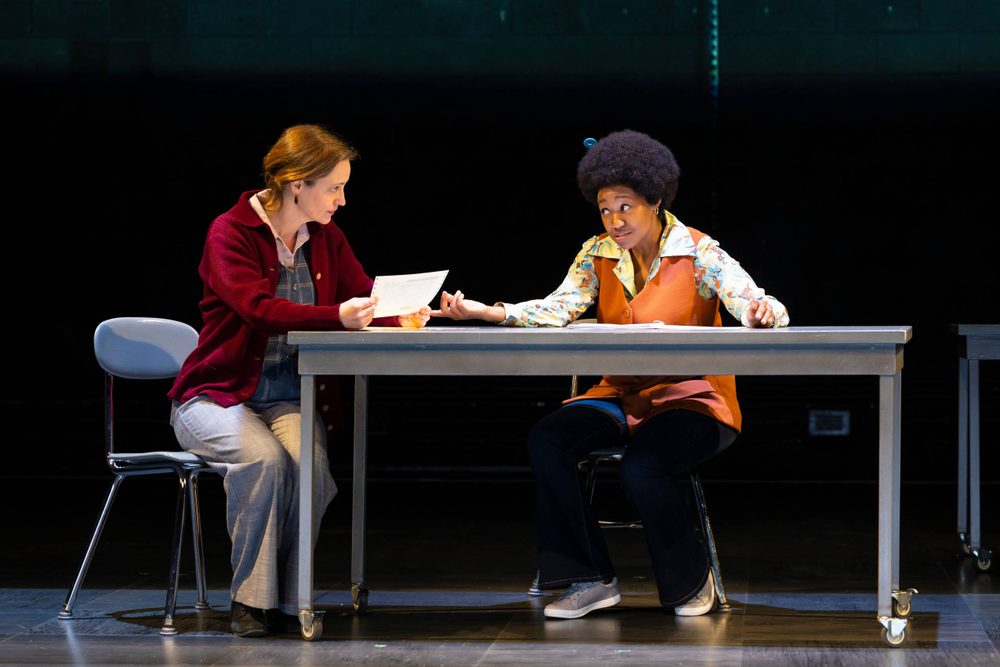
by Julie-Anne Whitney
Common Ground, Revisited – Co-conceived and adapted by Kirsten Greenidge; co-conceived and directed by Melia Bensussen; set design by Sara Brown; costume design by An-lin Dauber; lighting design by Brian J. Lilienthal; sound design by Pornchanok Kanchanabanca; projection design by Rasean Davonté Johnson; wig/hair and makeup design by J. Jared Janas; dramaturgy by Neema Avashia; stage-managed by Emily F. McMullen. Co-produced by The Huntington Theatre and ArtsEmerson at the Calderwood Pavilion/BCA through July 3, 2022.
Kirsten Greenidge’s new play, Common Ground, Revisited is inspired by and based in part on J. Anthony Lukas’1986 Pulitzer Prize-winning non-fiction book, Common Ground: A Turbulent Decade in the Lives of Three American Families. The primary focus of both texts is on class and racial tensions in Boston during the 1974 busing crisis when U.S. District Judge Arthur Garrity Jr. ordered nearly 20,000 Black and white students to be bused to/from the city’s geographically segregated public schools. The mandate led to years of violent protesting, significant demographic changes in the city and surrounding suburbs, and a dramatic decrease in enrollment in area schools that continues to this day. Fifty years after the 1972 Morgan v Hennigan case that led to Garrity’s ruling, Boston’s public schools are even more divided than they were back then with “two-thirds of BPS students attend[ing] intensely segregated schools where students of color make up 90% or more of the total enrollment.”
Greenidge’s adaptation closely examines the fraught experiences of the same three families from Lukas’ book; a working-class Black family and a middle-class white family in Boston’s quickly-gentrifying South End, and a working-class white family in Charlestown. The play also expands the story by including additional perspectives from educators, students, and activists to give a more balanced view of Boston’s complex history of racial inequity and injustice, or to put it as one character explains, “Boston’s persistent opposition to desegregation.”

Act One is a dizzying kaleidoscopic spin through Boston’s tangled history of public education. The fragmented snapshots of real-life characters, neighborhood dynamics, and historical context move so quickly that you will inevitably miss some of what is presented. But if you hold on tight, the history-hopping spin will eventually land you in a satisfying Act Two which centers almost entirely on the ‘74 busing protests.
Director Melia Bensussen’s somewhat inconsistent staging is supported by a stellar design team. Common Ground, Revisited is a robust, sprawling play that, without the right team, could easily be weighed down by its extensive subject matter. The Huntington’s production is a great example of how concise, collaborative design can clarify and elevate a difficult play. The production designs– created by Sara Brown (set), Brian J. Lilienthal (lighting), Pornchanok Kanchanabanca (sound), and Rasean Davonté (projections)– function beautifully together to shape and focus the story for the audience, helping to shepherd you through the revolving list of changing characters, times, and locations.
An ensemble of 12 Black and white actors narrates and guides the audience through the story. The cast frequently switches back and forth between their present-day narrative roles and dozens of real-life characters that span from the early 60s to the mid-70s. Standout performances include Maurice Emmanuel Parent in an array of delightful youths ranging from innocent children to angsty teenagers; Karen MacDonald as Louise Day Hicks, the Boston City Councilwoman and School Committee member who opposed desegregation; and Matthew Bretschneider as former Boston Mayor Kevin White who was Mayor during the height of the busing crisis.

Common Ground, Revisited offers a sharp, clear-eyed perspective of a challenging part of Boston’s history and in doing so gives insight into the city’s present problems. It suggests that the way toward a better future is through inclusion, conversation, and change– work that needs to happen in the classroom and the courtroom, and everywhere in between. For more information and tickets, go to: https://www.huntingtontheatre.org/whats-on/common-ground-revisited/

